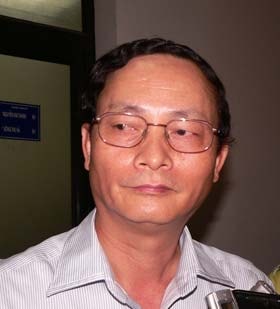Investment loss, EVN chairman loses position
The Prime Minister has just dismissed Mr. Dao Van Hung from his position as Chairman of the Board of Members of the Vietnam Electricity Group (EVN). Why did Mr. Hung have to leave? That is the question that is attracting public attention.
|
Mr. Dao Van Hung - Photo: K.Hung |
According to Minister and Head of the Government Office Vu Duc Dam, one of the reasons the Prime Minister dismissed Mr. Hung was due to losses in production and business results at the Electricity Telecommunications Information Company (EVN Telecom). In fact, not only did EVN Telecom suffer serious losses, leading to it having to be transferred to another unit to take over, many other investments in fields not related to the electricity industry also suffered "big losses".
EVN Telecom's burden
EVN Telecom was established in 1995 with the function of managing, operating, and exploiting the electricity telecommunications network, serving the direction, management, production, operation of the electricity system and business of EVN. This company conducts domestic and international telecommunications services; consults, designs, and establishes telecommunications projects... EVN Telecom has been invested 100% by the parent company with state capital with an amount of up to 2,442 billion VND (as of the end of 2010). Throughout its operation, EVN Telecom has been favored by the parent company allocating terminal equipment support costs with an amount of up to over 1,000 billion VND.
At the time of "wet feet" entering the telecommunications market, many experts had the opinion that EVN's investment was an investment outside the industry, but EVN leaders explained that it was not necessarily an investment outside the industry, EVN could take advantage of the existing power line and pole system and invest like that to maximize the industry's infrastructure to develop telecommunications. Moreover, EVN will invest in telecommunications based on 3G technology, providing many utilities, confident that it can compete. With this ambition, EVN Telecom launched many promotional programs, supporting terminal equipment for customers to attract subscribers. However, EVN Telecom is not able to launch truly competitive promotional packages like its competitors Viettel, Vinaphone, MobiFone... After the initial period of developing subscribers, EVN Telecom's customers gradually decreased.
In the telecommunications race, EVN quickly lost strength and its business was not effective. In 2010, EVN officially admitted defeat when Mr. Dao Van Hung stated that he was "very sad" because the telecommunications industry lost tens of billions of dong each month. Regarding responsibility, Mr. Hung did not mention any individual, only said that EVN had proposed equitization and selling off some of EVN Telecom's capital, but the project had not been approved after several months.
Rampant investment
Since Mr. Hung took the position of Chairman of the Board of Directors of EVN, the group has made decisions to invest in hot industries such as securities, banking, real estate, and telecommunications with a total investment capital of thousands of billions of VND at a time when EVN did not have enough capital to invest in electricity production and trading.
As of December 31, 2010, EVN's long-term financial investments amounted to nearly VND50,000 billion, of which nearly 90% were in subsidiaries. However, the total profit was only about VND540 billion, achieving a return on investment of more than... 1%. EVN also invested over VND2,100 billion in four sensitive and non-core business areas such as real estate, insurance, banking and finance, accounting for 3.27% of equity.
According to the audit report of EVN's 2010 financial statements, the State Audit assessed that EVN could not preserve its capital. In 2010, EVN's production and business lost 8,416 billion VND, not including more than 28,500 billion VND of potential losses from exchange rate differences, costs of supporting terminal equipment of telecommunications and electricity, and market prices of coal and gas... According to the audit report, EVN's estimated business activities in 2011 lost nearly 17,000 billion VND, with accumulated losses up to December 31, 2011 being 40,400 billion VND.
In October 2011, the Government Office issued a document conveying the Prime Minister's opinion on handling the results of the financial inspection at EVN. In particular, the Prime Minister requested the Ministry of Industry and Trade to coordinate with the Ministry of Finance to inspect the implementation of electricity price plans and evaluate EVN's investments outside the industry, especially investments in sensitive areas such as securities, banking, insurance and investments in EVN Telecom. The Prime Minister requested the Ministry of Industry and Trade to direct EVN to review the collective and individual responsibilities related to the violations.
Loss transfer EVN Telecom's 2010 financial report shows that the unit has lost more than 1,057 billion VND. That does not include the terminal equipment costs awaiting allocation from the year. 2006-2008 was not transferred to operating expenses but transferred to the power companies to allocate 1,026 billion VND. Accordingly, EVN Telecom will issue invoices to debit the above amount to the power corporations, these units will receive the debt, and at the same time, reduce the payable debt and increase EVN's investment capital in the unit. In essence, the transfer of terminal equipment costs is the transfer of losses from EVN Telecom's responsibility to the power corporations. In 2010, EVN Telecom thought it would be saved when FPT negotiated to buy back 60% of shares and deposited 708.8 billion VND. However, the deal failed when FPT withdrew its commitment because EVN only sold 49% of shares to outsiders, meaning EVN still held the main power in operating the business. Then the Prime Minister decided to let Viettel take over all of EVN Telecom from January 1, 2012, and the two sides were responsible for agreeing on related issues, including a plan to repay debts to EVN and its partners. |
According to Tuoi Tre

